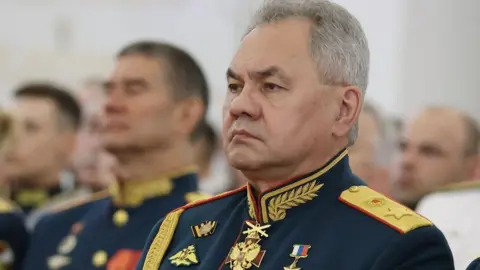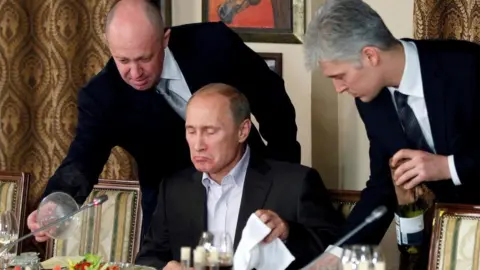Yevgeny Prigozhin: Wagner chief blames war on defence minister
 YEGOR ALIEV/SPUTNIK/KREMLIN POOL/EPA-EFE/REX/Shutt
YEGOR ALIEV/SPUTNIK/KREMLIN POOL/EPA-EFE/REX/ShuttWe're used to hearing Wagner chief Yevgeny Prigozhin ranting and raving at Russia's military leadership - particularly at defence minister Sergei Shoigu - for problems on the battlefield.
Public infighting between the Wagner mercenary group and the Ministry of Defence isn't new.
But this is.
In his latest video tirade via Telegram, Prigozhin blames Shoigu for starting Russia's war in Ukraine in February last year.
Speaking first about the fighting in eastern Ukraine that began in 2014 after Russia's military intervention, Prigozhin said: "We were hitting them, and they were hitting us. That's how it went on for those eight long years, from 2014 to 2022. Sometimes the number of skirmishes would increase, sometimes decrease."
"On 24 February [2022] there was nothing extraordinary happening there. Now the Ministry of Defence is trying to deceive the public, deceive the president and tell a story that there was some crazy aggression by Ukraine, that - together with the whole Nato bloc - Ukraine was planning to attack us.
"The war was needed... so that Shoigu could become a Marshal, so that he could get a second Hero Star… the war wasn't for demilitarising or de-nazifying Ukraine. It was needed for an extra star."
Prigozhin also blamed the war on oligarchs, condemning "the clan which in practice rules Russia today".
Strong words. But will they have consequences?
That depends on the nature of Prigozhin's current relationship with President Vladimir Putin. And no-one's quite sure what that is right now.
Is the tough-talking angry Prigozhin we see and hear on Telegram a fully-fledged Kremlin project? If so, his blame the war on Shoigu and oligarchs rant could be designed to shield Putin from public criticism, while offering the Kremlin a possible way out of a conflict that hasn't gone to plan, without damaging the president or the political system.
 Reuters
ReutersPrigozhin has named the fall-guys… and they don't include Putin.
But would that work?
After all, Putin is so closely associated with this war. In his address to the nation on 24 February 2022, the Kremlin leader made it clear that it was his decision to launch the so-called "special military operation", the full-scale Russian invasion of Ukraine.
Plus, arguing that the president has been woefully deceived by a minister he appointed doesn't reflect glowingly on the man at the top.
True, in Russia the Kremlin controls the media landscape and the messaging. If TV channels and pro-Kremlin military bloggers here were to transmit such an interpretation, many Russians would accept it.
But what if Yevgeny Prigozhin's outburst wasn't coordinated with the Kremlin?
What if he's acquired political ambitions of his own? Or concluded that, having made powerful enemies within the Russian elite (especially the military) for him attack is the best form of defence? Even if it means going off-message.
A 'rogue' Prigozhin risks rocking the boat - and Russia's political system - by undermining the Kremlin's messaging.
Only last week Putin repeated the need (as he sees it) to "demilitarise" and "de-nazify" Ukraine. Prigozhin's latest comments contradict that argument.
I've written before that making sense of Russian politics is like trying to do a giant jigsaw puzzle with most of the pieces missing. You attempt to connect the clues, but you're never quite sure what the final picture will be.
I'm still puzzling out Prigozhin.
But, aside from the Wagner chief, there are other interesting pieces of the Russian jigsaw which hint at a different outcome.
For example, as badly as things have gone for the Kremlin in Ukraine, might Moscow declare "mission accomplished"?
President Putin's spokesman Dmitry Peskov recently claimed that "the aim [of demilitarising Ukraine] has largely been achieved", arguing that Ukraine has less and less of its own armaments and is increasingly reliant on weapons from abroad.
And earlier this month more than 20 Ukrainian soldiers, members of the Azov regiment, went on trial in southern Russia. Russia calls Azov a "terrorist group" that harbours neo-Nazis. Could it portray the case as "de-nazification" and stop there?
But there are other indications that "stopping" is not in Putin's plans. In recent appearances on TV, he's come across as confident of victory and dismissive of Ukraine's counter-offensive.
"The enemy is suffering major losses," Putin told a Russian TV reporter this week, adding: "The enemy has no chance."
